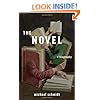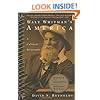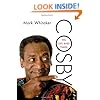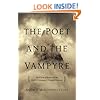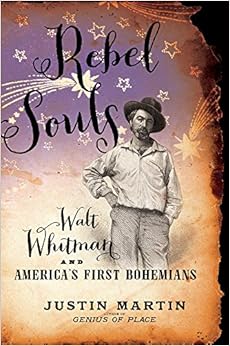
Rebel Souls: Walt Whitman and America's First Bohemians
and over one million other books are available for Amazon Kindle. Learn more


Flip to back
Flip to front

Rebel Souls: Walt Whitman and America's First Bohemians (A Merloyd Lawrence Book) Hardcover – September 2, 2014

$19.74
FREE Shipping on orders over $35.
In Stock.
Ships from and sold by Amazon.com.
Gift-wrap available.
NO_CONTENT_IN_FEATURE
Start reading Rebel Souls on your Kindle in under a minute.
Don't have a Kindle? Get your Kindle here, or download a FREE Kindle Reading App.
Don't have a Kindle? Get your Kindle here, or download a FREE Kindle Reading App.
Browse in Books with Buzz and explore more details on selected titles, including the current pick, "Neil Patrick Harris: Choose Your Own Adventure," an engaging, interactive dive into the versatile actor's life (available in hardcover and Kindle book).
Product Details
Would you like to update product info or give feedback on images?.
|
Editorial Reviews
Review
Kirkus Reviews, BEA & ALA Book Guide, 5/15/14
“[An] entertaining cultural history…The author’s solid research into the connections of these curiously varied men and women makes this a wonderful story of one of the world’s odd little cultural cliques.”
Publishers Weekly, 6/30/14
“An engaging history of a literary underground…Though Walt Whitman is the best-known of the group, readers may find themselves drawn to his lesser-known comrades…Martin's writing rises to the occasion…A worthwhile read…Introduces armchair literary historians to a dazzling cast of eccentrics.”
Booklist, starred review, 8/1/14
“This is popular history the way it should be, well-researched and authoritative yet demotic in idiom and unpretentious in presentation, a darn good read.”
Wall Street Journal, 9/6/14
“Elaine's, the Algonquin Hotel, the White Horse and Cedar taverns: These and a few other Manhattan establishments have become legendary as places for writers and artists…On the evidence of Justin Martin's Rebel Souls, the long-defunct watering hole Pfaff's deserves similar fame…[Martin] is a fluent, companionable writer, and he manages to weave his many biographical strands into an engaging narrative—no mean feat…The experience of reading Rebel Souls is a bit like hovering on the sidewalk near the entrance to Pfaff's, listening to the sounds of jollity and vehemence wash up from the basement below. Mr. Martin does a fine job of making us feel that we're back on antebellum Broadway.”
EDGE, 8/29/14
“Martin's sharp and elegiac prose follows the lives of the Bohemians, many who meet tragic ends. Their stories are grandly entertaining to read, and Martin rescues a large chunk of our cultural history.”
The ARTery, 9/4/14
“It’s rare for a book to conjure the feeling of being in a bar with one’s rowdiest and most interesting friends. Rebel Souls…does just that, highlighting a group of daring individualists who helped shape American culture…Martin gives us a different side of Whitman: A struggling poet trying to find his place both in the world and among a coterie of noisy fellow travelers. These fellow artists were some of the most interesting characters to haunt American letters and stages in the days just before, during and just after the war…In Rebel Souls, Justin Martin renders those times, these bold Americans and the places they strode with telling detail. It’s a story about the risks and rewards of being an original and the far-reaching effects this can have.”
New York Press, 9/9/14
“Martin takes us into the scintillating world of Pfaff’s saloon in the 19th century…What happened in Pfaff’s saloon in the 1850s is stuff of literary legend…The Greenwich Village saloon was finally paid the homage it deserves with the release of Rebel Souls.”
Los Angeles Review of Books, 9/11/14
“[A] compelling, insightful group biography…Vividly describes not only Pfaff’s heyday, but also how Clapp’s coterie, once it was dispersed by the chaos, duties, and opportunities brought by the Civil War, came to define an unmistakably American species of rebel artist…Martin sets himself an ambitious task, and rises to it in the structure and reach of his telling. In 1860, the war scatters his protagonists, whose fates he follows for the latter two-thirds of Rebel Souls like a literary LoJack...Martin’s done a remarkable job bringing ‘those times, that place’ very much alive through his painstaking research…Pfaff’s rebel souls, Martin makes plain, are all around us.”
Roanoke Times, 9/11/14
“Rebel Souls is at once a recreation of New York during the mid-19th century and a group biography of people who changed the way Americans viewed art, politics and themselves…A muralesque portrait of a group of intentional misfits who would, in the middle of the 19th century, help transform American literature, theater and journalism and forever alter the way we look at ourselves and our society.”
Brain Pickings, 9/16/14
“Shed[s] light on the untold story of the Pfaff’s set and its ample reverberations through the last 150 years of creative culture…Rebel Souls is an enormously absorbing read in its entirety, exploring the blossoming of Whitman’s literary legacy, the tantalizing group of artists, writers, and performers who populated Pfaff’s and influenced one another, and how they made their way West to meet Mark Twain’s Bohemians of Silicon Valley.”
Washington Post, 9/21/14
“Rife with...scintillating anecdotes...This period in Whitman’s development is often skated over in biographies of the Good Gray Poet, and Martin has done us a favor by bringing it, along with a host of other artistic connections, amusingly and indelibly back to life."
Boston Globe, 9/21/14
“Whitman now is a central figure in the American canon, but his Pfaff’s pals are all but forgotten. In Rebel Souls, biographer Justin Martin brings them wonderfully to life in his enjoyable romp through the milieu. Whitman is the emotional core of the book — Martin’s passages on Whitman’s romantic travails and his experiences tending to wounded soldiers during the Civil War are unforgettably moving. But the other members of the Pfaff’s coterie almost steal the show.”
Cape Cod Times, 9/14/14
“The book is a veritable who’s who of the 19th-century’s movers and shakers.”
New York Journal of Books, 9/18/14
“Martin’s historical scope and elegiac prose, laced through with parlance of the period, is not only grandly entertaining to read, it rescues this bit of cultural history and gives Whitman a more human dimension past the iconic image.”
InfoDad, 9/18/14
“Enthusiasts for the byways of American history will enjoy Justin Martin’s exploration of the crowd that used to hang out at Pfaff’s Saloon in New York City—an establishment that was the first gathering place of Bohemian-style thinkers and possibly the young nation’s first gay bar…Martin writes about Pfaff’s and its coterie with skill and attentiveness.”
Hudson Valley News, 9/17/14
“Anyone who loves history, and particularly literary history, will want to read this book.”
Waterbury Republican-American, 9/21/14
“Fascinating and eye-opening.”
Neworld Review, September 2014
“A highly informative look at the very first attempt here in America where novelists, poets, actors, dancers, visual artists and journalists, came together and tried to create a society…Martin does an excellent job in Rebel Souls, in drawing insightful portraits of some of the main characters like Whitman, which is the heart of his book.”
Reviews by Amos Lassen, 9/19/14
“Written in prose that pulls us in with the first sentence and keeps us until the last sentence when we are left wanting even more.”
Buffalo News, 10/5/14
“What a cable TV series this would make.”
Cleveland Plain Dealer, 10/1/14
“Engaging…The idea of the artist as outsider or rebel (at least the American version of it)—and, indeed, the thing that, a century later, would be called a counterculture—can be traced to Clapp and Pfaff's. Martin's book is a lively and intelligent entree into that heretofore mostly forgotten world.”
Queerty.com, 10/5/14
“A vibrant and well-researched tale that shows how this first bohemian culture seeded and nurtured an American tradition of rebel art that continues to this day.”
Bookviews, October 2014
“For anyone who loves history and wishes to understand Whitman’s times, his life and work, this book is a real treat!...This is a book that is a fascinating look at the era in which the most famed of American poets found his unique voice.”
About the Author
Justin Martin is the author of three highly praised previous biographies: Greenspan: the Man behind Money, Nader: Crusader, Spoiler, Icon, and Genius of Place: The Life of Frederick Law Olmsted. As one of the few journalists to gain access to Greenspan, Martin produced a best-selling biography of the secretive Fed chairman, selected as a notable book by the New York Times Book Review. Martin’s Nader biography served as a primary source for An Unreasonable Man , an Academy Award–nominated documentary. Genius of Place, the first full scale biography of Olmsted received glowing reviews nationally. Martin’s articles have appeared in a variety of publications, including Fortune, Newsweek, and the San Francisco Chronicle .
More About the Author
Justin Martin is author of the upcoming Rebel Souls: Walt Whitman and America's First Bohemians (September, Da Capo Press). Earlier efforts includes biographies of pioneering landscape architect Frederick Law Olmsted, Fed chairman Alan Greenspan, and Ralph Nader, the noted consumer advocate. Martin's articles have appeared in a variety of publications including the New York Times, Newsweek, and the San Francisco Chronicle.
Martin is a 1987 graduate of Rice University in Houston, Texas. He lives with his wife and twin sons in Forest Hills Gardens, New York, a landmark neighborhood designed by Frederick Law Olmsted Jr. In his spare time, Martin runs marathons (he's completed seven) and gardens (he's grown some great tomatoes, but his experiments in urban corn-growing have so far failed).
Martin is a 1987 graduate of Rice University in Houston, Texas. He lives with his wife and twin sons in Forest Hills Gardens, New York, a landmark neighborhood designed by Frederick Law Olmsted Jr. In his spare time, Martin runs marathons (he's completed seven) and gardens (he's grown some great tomatoes, but his experiments in urban corn-growing have so far failed).
Customer Reviews
Most Helpful Customer Reviews
6 of 6 people found the following review helpful
By
Kate Buford
on September 10, 2014
Format: Hardcover
Verified Purchase
Comment
Sending feedback...
I loved Martin's biography of Frederick Law Olmsted, so I looked forward very much to this book for another fascinating look at an important piece of 19th century American history and culture. And, I got it to this heart's content. Though the story is weighted toward Walt Whitman, as the most famous of the Manhattan Bohemians for our time, it is really an ambitious, multi-subject biography of a remarkable group of artists, written with a light, accessible style that suits the subject. Martin takes us right into the vibrant, iconoclastic world of these first American Bohemians -- what they ate, drank, loved, wrote about, and otherwise consumed in their intense, often very short, lives. Threading through all the parallel tales is the giant figure of Whitman himself. Martin gives us an unforgettable portrait of this great poet that will linger in readers' minds and hearts for a long time to come.
Thank you for your feedback.
If this review is inappropriate, please let us know.
Sorry, we failed to record your vote. Please try again
7 of 8 people found the following review helpful
By
Brett Perkins
on August 27, 2014
Format: Hardcover
Verified Purchase
Comment
Sending feedback...
Rebel Souls is the collision of a great writer and a great subject. The cast of characters assembled within are so colorful that they border on fiction. Fitz-James O'Brien was a personal favorite--if I want to laugh out loud I reread the paragraph where he pans his own play. Seeing a fresh side of Whitman is easily worth the price of admission, but the madness surrounding him below Broadway is priceless. The whimsy, suffering and hubris provided by the Pfaff's gang is palpable.
Martin has done a wonderful job, creating a smooth, clever narrative which rewards the reader from beginning to end. The thorough research is obvious and the delivery feels effortless. I couldn't have had more fun.
Martin has done a wonderful job, creating a smooth, clever narrative which rewards the reader from beginning to end. The thorough research is obvious and the delivery feels effortless. I couldn't have had more fun.
Thank you for your feedback.
If this review is inappropriate, please let us know.
Sorry, we failed to record your vote. Please try again
6 of 7 people found the following review helpful
By
Helen H. Moore
on August 27, 2014
Format: Hardcover
Comment
Sending feedback...
I love this book! Got a jones for historical narrative? Rebel Souls will satisfy--it's a fascinating, immersive, highly entertaining history, richly populated with celebrated characters and historic events you only thought you knew. Author Justin Martin deploys his abundant narrative gifts, untangling and laying bare the intersecting lives of the outrageous men and brazen women who formed the core of "Pfaff’s Bohemians." As important to the literary and cultural life of New York City as the members of the Algonquin Round Table would be in their own time, the "Rebel Souls" who congregated at Pfaff's underground tavern are a Who's Who of journalists, poets, authors, artists, and bums. This utterly beguiling book will introduce you to a part of New York's forgotten history and the proto- beatniks, -hippies and -performance artists who gave it life. I couldn’t put this book down and it kept me amazed at all the ways in which our cultural forebears were so like us—and so different from anything and anyone who had come before.
Thank you for your feedback.
If this review is inappropriate, please let us know.
Sorry, we failed to record your vote. Please try again


